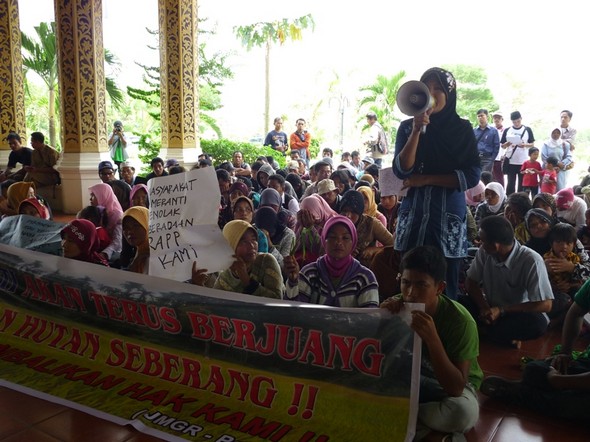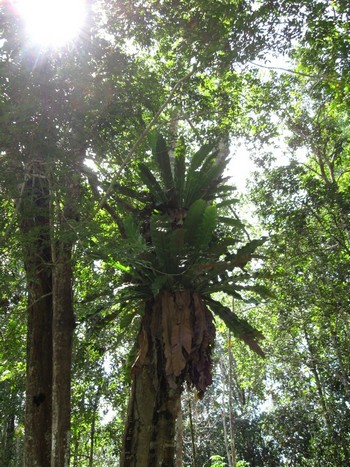Indonesia has set ambitious targets to reduce its greenhouse gas emissions that will require major changes in how forests and agricultural lands are managed
Patrick Anderson
Indonesia is one of the first nations from the global south to commit to reduce its greenhouse gas emissions by 2020. Three quarters of Indonesia’s emissions result from deforestation and land degradation, so meeting this commitment will require major changes in how the country manages its forests. Many groups are hoping that efforts to reduce deforestation will include respecting the right of traditional communities to own and manage their customary forests.
The challenges are enormous. In 2006, reports by the World Bank and Wetlands International revealed that the destruction of Indonesia’s forests and peatlands were causing very high emissions of greenhouse gases, making Indonesia the third largest greenhouse gas emitter in the world, after the USA and China. At first Indonesian officials denied the reports but studies over the coming years confirmed that deforestation and peat soil loss was releasing about two billion tons of carbon dioxide annually. Per capita greenhouse emissions in Indonesia are therefore about ten tons annually, higher than China (five tons per year) and similar to Europe (eight to ten tons a year), but less than half the per capita emissions in Australia or the US (both more than 20 tons).
Climate villain to global leader
In 2009, the President of Indonesia, Susilo Bambang Yudhoyono, announced at the G20 Major Economies Summit in Pittsburgh, USA, that by 2020 Indonesia would unilaterally reduce its greenhouse gas emissions by 26 per cent below business as usual projections, and by up to 41 per cent with international support. As about 80 per cent of Indonesian emissions are a result of forestry and agriculture, these sectors are where Indonesia is planning to cut emissions to achieve the target. In May 2010, Indonesia signed a Letter of Intent with Norway to undertake measures to reduce its emissions from deforestation and forest degradation. Under the agreement, Norway will provide one billion dollars over five years to assist efforts to reduce emissions, including a two-year moratorium on granting new forest conversion permits. In May 2011, President Yudhoyono issued an Instruction requiring a two-year moratorium on the issuing of new licenses for development in primary forests and peat lands. A Presidential Task Force is developing Indonesia’s national plan for Reducing Emissions from Deforestation and Degradation (known as REDD+), and will monitor implementation of the moratorium. REDD+ can include activities that maintain and increase carbon stocks, such as low impact logging and tree planting, as well as efforts to reduce deforestation.
Indonesia has about 20 million hectares of peat swamp forests, which contain some 40 billion tons of carbon. Peat swamps are areas where the water table is at or above ground level for most of the year. Leaves, sticks and dead animals falling into the swamp do not rot due to the acid conditions, and build up as soil organic matter which can reach more than ten metres in depth. As the pulpwood and oil palm industries seek to expand operations in Indonesia today, there are few available areas of mineral soils which haven’t already been cleared for agriculture or are reserved for permanent forests. Peat swamps offer some of the few areas where companies can obtain permits to convert large contiguous areas of forest into agriculture. But clearing and draining peat soils releases about 70 tons of carbon dioxide per hectare per year. Whether or not Indonesia can revise its plans to clear and drain its remaining peat forests is yet to be seen.
Although the Indonesian president made a clear commitment to reduce greenhouse gas emissions, the ministries of forestry and agriculture and the industries which they serve lobbied successfully for the right to continue to clear forests during the moratorium period if in principle permits for forest conversion had already been issued. Commentators have noted that in many districts such permits already cover most of the available forests. As an alternative to reducing deforestation, the forestry department is planning to plant a billion trees as a way to absorb carbon dioxide. However, it takes decades for the carbon released into the atmosphere by clearing a forest to be drawn down again by the trees in a plantation. The simplest way for Indonesia to reduce greenhouse gas emissions is to stop deforestation, and to force plantation expansion to take place on lands that have already been cleared. There are signs that industry is starting to move in the right direction.
Industry takes the lead?
Following a campaign by Greenpeace targetting its international consumers, including Unilever and Nestle, in February this year, Golden Agri Resources (GAR), one of the largest oil palm plantation companies in Indonesia, owned by the conglomerate Sinar Mas, announced that it will no longer convert peat forests and will only establish oil palm plantations on areas which contain less than 35 tons of carbon per hectare. If implemented, this means the company will not clear degraded secondary forests, and will limit its plantation establishment to existing agricultural areas or grasslands. While it remains to be seen if the company can abide by its commitment (it made a similar promise in early 2010 which was immediately broken) it is helpful in showing government and industry that companies are willing to give up on expanding the agricultural frontier, and can leave the country’s remaining rainforests and peat forests standing.
GAR’s accouncement included a commitment to respect the rights of indigenous peoples, and to identify and protect high conservation values before establising plantations, which are requirements of the voluntary international standard for oil palm, the Roundtable on Sustainable Palm Oil (RSPO).
 |
|
Women from Teluk Meranti in Riau Province, Sumatra protest at the office of Pelalawan district government, pressing for recognition of their rights over the forest areas licensed to the APRIL pulp and paper company, August 2010 / Rini Ramadhanti |
The pulp and paper industry is also causing massive greenhouse gas emissions as it clears peat forests and drains peat soils, especially in the provinces of Riau (see article by Silvia Irawan in this edition) and Jambi in Sumatra. As with the oil palm industry, peat forests are the only areas available where pulp and paper companies can get big, contiguous blocks covering tens of thousands of hectares. Asian Pulp and Paper, which is owned by the same conglomerate as GAR, has so far refused to give up on its plans to clear peat forests and drain peat soils. It is also taking over community lands without the consent of communities. The other major pulp and paper company in Indonesia, APRIL, is also clearing deep peat to plant Acacia pulpwood plantations. Both companies are attempting to develop REDD projects to avoid emissions from deforestation, but these efforts appear to be little more than attempts to green the companies’ images, given the massive ongoing emissions both firms create by clearing forests and draining peatlands.
Forest peoples are the best forest managers
Indonesia’s forests are home to more than 50 million people, most of whom are members of indigenous peoples who continue to practice systems of forest management that maintain forest health and diversity. Recent studies by the University of Illinois in a dozen tropical countries consistently demonstrate that where communities have management control, their forests hold more carbon and biodiversity and generate greater revenue into the local economy than when forests are managed by governments. Indonesia’s efforts in recent decades to develop forestry industries and convert forests for oil palm plantations have come at enormous cost to its indigenous communities, who are still treated by the forestry department as illegal squatters on state land. The government’s commitment to reduce emissions from deforestation may be the best chance in decades to get it to respect community rights.
The government’s commitment to reduce emissions from deforestation may be the best chance in decades to get it to respect community rights.
Some of the most complicated issues that will need to be addressed for REDD+ to be effective involve forest tenure. The forest zone designated by the Ministry of Forestry covers 70 per cent of the land area of Indonesia. Forestry law in Indonesia recognises private forests and state forests, and requires the Forestry Department to establish which forest areas are burdened with rights before determining the boundaries of the State Forests. In practice, such delineation has almost never happened, and the Forestry Department has assumed that all forests are State Forests, and that local communities living in these areas or using the forests are illegal. Permits for industrial logging and plantation development have been handed out over the last three decades covering tens of millions of hectares of forests. The impacts on local communities dependent on forests have often been severe, with loss of livelihoods, and criminal prosecution for accessing their customary resources.
The international framework for REDD+, which the Indonesian government has agreed to follow, requires REDD+ developments to respect the rights of indigenous peoples, including their right to give or withhold their consent to planned developments that may affect them, called Free, Prior and Informed Consent (FPIC). So, although forestry developments to date have ignored or violated the rights of local communities and indigenous peoples, there is a commitment from the government for REDD+ to be developed in a different way.
Whether or not this commitment in principle can be put into practice remains to be seen. Since 1979, the Indonesian government has imposed a system of local government on indigenous peoples and local communities regardless of their own systems of decision-making and local rules and regulations. In many communities, due to decade of impositions by the State, the traditional systems of Adat, or custom, are weak. The principle of Free, Prior and Informed Consent includes the right of communities to chose which institutions they will use to discuss and negotiate with outsiders. Indications from other sectors where the right is respected are that communities may choose a hybrid of traditional institutions, government systems and representatives, which these days are elected by the community rather than being appointed.
In early 2011, the Ministry of Forestry completed research showing that there are more than 25,000 villages within Indonesia’s forest zone. The overall population of these villages is probably in the range of fifty million people. Small as it may seem, admitting that communities live in the forest zone is a major step forward by the government. Human rights and community support groups hope to turn this acknowledgement into positive steps to recognise the rights of those communities to manage their customary forests. With international donors requiring respect for human rights, Indonesia’s commitment to reduce emissions from deforestation may lead to greater livelihood security and poverty reduction for tens of millions of Indonesia’s rural poor.
Patrick Anderson (patrickanderson1960@gmail.com) is Policy Advisor with the Forest Peoples Programme. He has lived in Indonesia for ten years, and works closely with Indonesian organisations concerned with forests and community rights.












